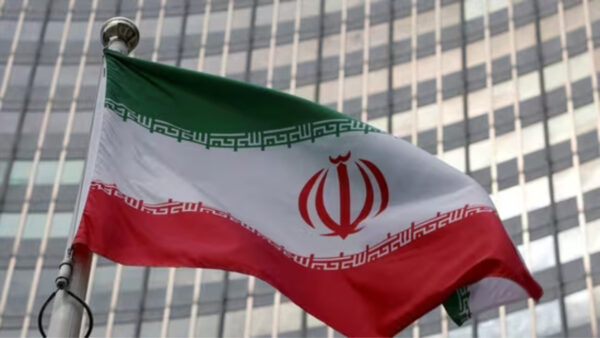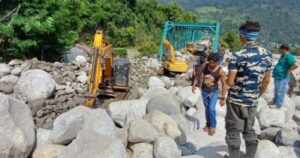Cross-Border Strife: Iran Strikes Jaish al-Adl Base in Pakistan, Igniting Diplomatic Tensions
The Pakistani foreign ministry, in a strongly worded statement, expressed heightened concern over the airstrike, underscoring the illegality of such an act despite established communication channels between the two nations. The statement revealed Pakistan’s deep disappointment, especially given the existing avenues for dialogue.

The Iranian flag(REUTERS)
In the wake of a dual suicide bombing earlier this month, attributed to the Islamic State, Tehran has responded with a series of targeted strikes in Iraq and Syria. The recent attack on an Iraqi and Syrian front comes as Iran seeks to assert its retaliation against the backdrop of escalating tensions. The complex geopolitical landscape is witnessing Tehran’s calculated response, unraveling a web of interconnected events that have sparked concern and ignited debates on the volatile regional dynamics.
We’re now on WhatsApp –Click to join.
In a tragic turn of events, the loss of innocent lives occurred as a consequence of what Pakistan vehemently asserts to be an ‘illegal’ airstrike carried out by Iran. The heart-wrenching incident claimed the lives of two young children, while three others sustained injuries, casting a shadow of grief over the affected families. In swift response, Pakistan’s foreign ministry urgently summoned Tehran’s top diplomat in Islamabad to register a formal and vehement protest against the alleged ‘unprovoked violation of its airspace.’ This incident has not only amplified bilateral tensions but also underscored the fragility of regional relations, prompting a closer scrutiny of the circumstances surrounding this deeply regrettable episode.
As the geopolitical landscape witnesses a ripple effect, Iran’s state-run IRNA news agency and state television initially reported a striking development: the deployment of both missiles and drones in a series of targeted strikes within Pakistan. The English-language arm of Iranian state television, Press TV, swiftly attributed the orchestrated attack to none other than Iran’s paramilitary Revolutionary Guard, introducing a dimension of military intensity to the unfolding narrative. However, a sudden air of confusion enveloped the situation as quickly as it had emerged, with state media reports on the incident mysteriously disappearing, leaving observers and analysts in a perplexing state of uncertainty. The sudden vanishing act of information adds an enigmatic layer to an already complex geopolitical scenario, raising questions about the strategic calculations behind the initially disclosed military engagement.
In a bold and consequential move, Iran has openly declared that the focal point of its recent military strikes was the bases housing the militant group Jaish al-Adl. This strategic targeting, aimed at the ‘Army of Justice,’ adds a new layer of complexity to the already heightened tensions in the Middle East, particularly against the backdrop of Israel’s ongoing conflict with Hamas in the Gaza Strip. Jaish al-Adl, a Sunni militant group founded in 2012 and primarily active on the Pakistani side of the border, has a notorious history of claiming responsibility for bombings and the abduction of Iranian border police. As Iran takes direct military action against this group, the region witnesses a potential escalation in hostilities, underscoring the intricate web of conflicts that characterize the contemporary Middle East.
In a departure from historical norms, Iran has ventured into uncharted territory by orchestrating a missile-and-drone assault on Pakistan, marking an unprecedented escalation in its response to border clashes with militants. The audacious move, previously unseen in Iran’s military playbook, has raised eyebrows and concerns across the geopolitical spectrum. According to Iranian reports, the targeted strikes were strategically placed in the mountainous terrain of Pakistan’s Baluchistan province, adding a geographical twist to this unconventional and unexpected military maneuver. As the shockwaves of this unprecedented event reverberate through the region, the incident introduces a new dynamic into the complex landscape of cross-border relations, leaving analysts and diplomats grappling with the implications of Iran’s bold and unprecedented military strategy.
In a swift and stern response to the violation of its sovereignty, Pakistan has unequivocally condemned the incident as “completely unacceptable,” emphasizing the potential for serious consequences in the aftermath of the unprecedented missile-and-drone attack launched by Iran. This unforeseen military escalation has intensified tensions between Tehran and Islamabad, territories that have historically accused each other of harboring militants. While accusations and border clashes have been a recurring theme, direct engagement by official forces has been a rarity.
The Pakistani foreign ministry, in a strongly worded statement, expressed heightened concern over the airstrike, underscoring the illegality of such an act despite established communication channels between the two nations. The statement revealed Pakistan’s deep disappointment, especially given the existing avenues for dialogue. “It is even more concerning that this illegal act has taken place despite the existence of several channels of communication between Pakistan and Iran,” the statement read. A formal protest has been lodged with senior officials in the Iranian Ministry of Foreign Affairs in Tehran.
The ministry further emphasized that such unilateral actions are contrary to the principles of good neighborly relations, capable of seriously undermining bilateral trust and confidence. This latest episode introduces a new strain into the complex dynamics of cross-border relations, as both nations grapple with the ramifications of this unconventional military maneuver.
Adding to the complexity, the attack on Pakistan came just a day after Iran executed similar strikes in Iraq and Syria. Iran targeted what it claimed were Israeli “spy headquarters” in Irbil, the capital of Iraq’s northern semi-autonomous Kurdish region, and locations associated with the Islamic State group in northern Syria. These strikes, occurring against a backdrop of heightened regional tensions, followed Islamic State’s claimed responsibility for two suicide bombings earlier in the month.
Iran’s Revolutionary Guard, in a statement, asserted launching four missiles at IS positions in Syria’s Idlib province and 11 missiles at the Kurdish region in northern Iraq, claiming to have hit a center of Mossad, the Israeli intelligence agency. However, Qassim al-Araji, adviser for national security affairs to Iraq’s Prime Minister Mohammed Shia al-Sudani, heading a committee investigating the attack in Irbil, dismissed Iran’s “claims of targeting a Mossad headquarters” as baseless.
In response to the Iranian strikes on northern Iraq, Iraq has taken a decisive stance, recalling its ambassador from Tehran for consultations and summoning Iran’s chargé d’affaires in Baghdad to protest the violation of its sovereignty. The Iraqi Foreign Ministry strongly condemned the Iranian attack as a “blatant violation” of Iraq’s sovereignty, contradicting principles of good neighborliness and international law, and posing a serious threat to the security of the region. The situation remains fluid as regional dynamics continue to evolve, and diplomatic tensions escalate in the aftermath of these multifaceted and interconnected events.

Kumud Sharma is the First Well-Known Female Journalist of the Journalism World of Himachal Pradesh. I am the Founder, Editor in Chief, Managing Director, Promoter of DiaryTimes. As a Female Journalist, With My Experience of More Than Nine Years, I Tell You Every News of Himachal Pradesh From The Ground Level With Absolutely Accurate and Correct Information, Be it the Politics of Himachal Pradesh or the Ground Reality, My Perspective On Every News Will Give You Assurance. I Assure You That Every News of Mine Will Comply With the Expertise and Fact Checking Policy.








